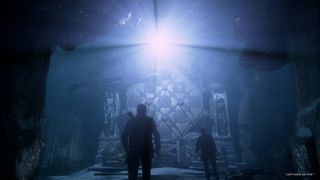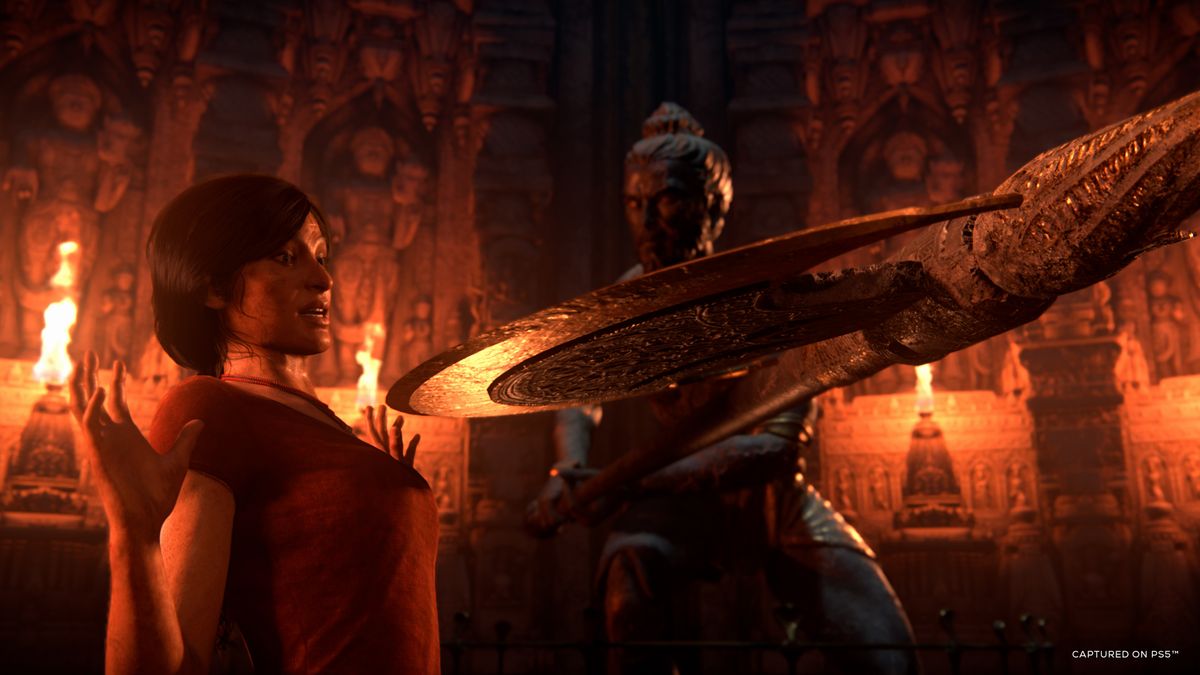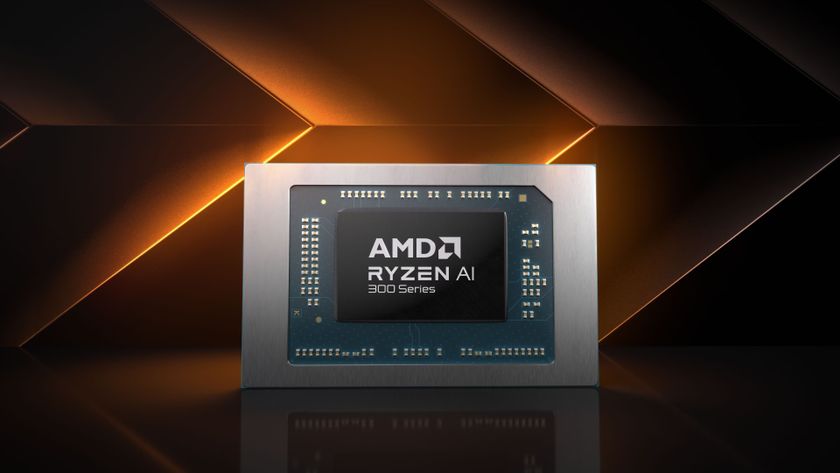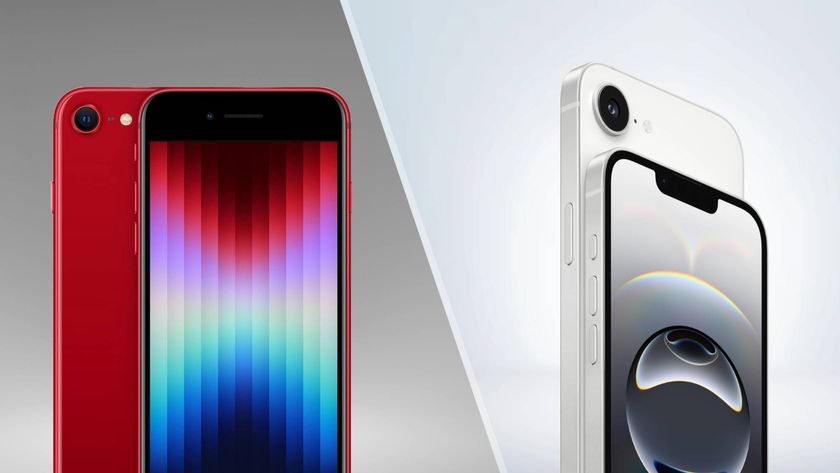Laptop Mag Verdict
Uncharted: Legacy of Thieves Collection is a well-earned victory lap for one of the best story-driven games of the last generation. It has been souped up to take full advantage of the PS5, but it also performs incredibly well on both PC and Steam Deck. The lack of multiplayer will sting for some, but now it’s time for Naughty Dog to head back to the drawing board and reinvent itself.
Pros
- +
Two amazing stories
- +
Powerful PS5 upgrades
- +
A gorgeous visual feast
- +
Impressive optimization across PC specs
- +
Runs surprisingly smooth on Steam Deck
Cons
- -
No multiplayer
- -
Pacing problems persist at the end
- -
It’s time for Naughty Dog to change the formula
Why you can trust Laptop Mag
Uncharted: Legacy of Thieves Collection has been given the full PC treatment — dropping on Steam and Epic Games Store for $50/£45.
Nathan Drake’s final chapter and the continuation of Chloe Frazer’s story are combined into this package, and after a few months of being a PS5-only title, it is finally coming to PC.
Plus, thanks to the game supporting AMD’s FidelityFX Super Resolution (FSR) upscaling tech, you can actually take this around with you on the Steam Deck.
But is this all worth it? Should first timers drop their cash on this, or is the omission of multiplayer going to be a challenge? Let’s find out.
Uncharted: Legacy of Thieves Collection PC performance

For PC testing, I put two systems through their paces with Naughty Dog’s game: a mid-range Asus TUF Gaming F15 with 12th Gen Intel Core i7 and an RTX 3060, along with my super old Asus ROG Zephyrus G15 with 3rd generation AMD and a GTX 1650.
Let’s start with a general observation across both systems: tinkering with graphics settings is a must, because the game seems to overestimate how much RAM and vRAM you have. For example, for the TUF F15, Uncharted was set by default to ultra settings, whereas the ROG G15 was turned to high.
The CUDA cores and clock speeds may be capable, but without the vRAM to back it up, you quickly run into stuttering and rubber banding, as the game slows to a crawl and fast forwards to catch up. Head over to graphics settings and make sure you are well under that vRAM max bar.
Once you’ve done that, the TUF F15 hits a solid 60 fps on a mix of medium and high settings with no FSR. Turn FSR onto “quality” and that bumps up to 80 fps. The ROG Zephyrus G15 achieves that same full 60 fps with FSR on “balanced” and medium/low settings.
Uncharted: Legacy of Thieves Collection Steam Deck performance

Most importantly for me, as I can’t get anywhere near the TV with my partner watching Great British Bake Off and Strictly Come Dancing, is that the game needs to work well on Steam Deck.
Thanks to FSR 2.0 set to balanced, you can get a reliable 30 fps with medium settings, which looks great on a screen this small. If frame rate is your priority, turn those graphical settings down to low and turn FSR to performance to get between 40-50 fps.
For those chasing fidelity, with FSR on quality, that frame rate can get a little juddery at a 25 fps average. For the more livelier moments of action gameplay, this could be the difference between missing your key grapple hook point and plunging to your death.
My recommended settings would be to turn resolution down to 1152 x 720, set graphics presets to medium, and FSR on balanced for a frame rate that stands firm between 35-40 fps.
Uncharted: Legacy of Thieves Collection PS5 performance

Since reviewing Legacy of Thieves earlier this year, the performance of the PS5 version has undergone some changes. Like before, Uncharted gives you a choice between three graphics options:
- Fidelity Mode: Full 4K at 30 fps
- Performance Mode: 1440p resolution upscaled to 4K at 60 fps
- Performance+ Mode: 1080p at 120 fps
With an ElectriQ eiQ-32M4K144FS monitor, I can finally test the HDMI 2.1-exclusive Performance+, and put simply, it’s oh-so buttery smooth. The vast majority of the time, you will hit a full 120 fps, which makes your character movement feel all the more fluid and responsive to your controller inputs.

There are a couple of downsides in the form of a noticeable reduction in fidelity (going down to 1080p) and in the busier on-screen moments, that framerate can slow a little down to just over 100 fps at its worst. But it is refreshing to see it running so smoothly, though this is only half the story.
Most interesting is the addition of new frame rate modes and variable refresh rate (VRR), which comes with an “unlocked framerate” switch across its various modes (provided you have the right TV/monitor to support it). Fidelity mode now runs at a rock solid 40 fps, no matter what on-screen stress tests I threw at it. That small change improves on-screen response times, unlocks the unused potential of the PS5’s GPU, and makes this full 4K mode feel a lot better.
Meanwhile, the unlocked frame rate modes are, without a better way of saying it, pretty mind-blowing. Fidelity Unlocked is pretty all over the place, but a lot closer to Performance+ than you may think — seriously impressive given you are running at 4K. Yes, it can vary from up to 110 fps down to 30 fps in the busier moments, but the fact it stays closer to triple digits shows what Sony’s console is capable of.

To get a more reliable frame rate, Performance Unlocked hits a super stable average of 101 fps in my testing at 1440p resolution. That makes this mode the best of both worlds in my opinion, as it provides an impressive smoothness and gorgeous visuals that the human eye will find it difficult to tell the difference when compared to 4K.
For those with HDMI 2.0 TVs, the increase to 60 fps in Performance mode is a night and day difference in fluidity. It makes the more intense moments of grappling hook/shooting action much smoother to play, and the drop off to 1440p from full 4K is negligible.
Not only that, but loading times are far faster.The DualSense controller’s haptic feedback and adaptive triggers are used effectively and the sound has been upgraded with 3D audio.
All in all, this is a fun romp to dive back into with a nice new lick of paint, but there are some questions I’d raise here. First, what gives with the lack of multiplayer? I know not many people went online with this game, but the mode was a lot of fun for the community it had. To cut it entirely is a little gutting.
And second, in a time of free upgrades, Xbox’s smart delivery functionality, and lower-price remasters, is $50/£50 really a fair cost to newcomers to Uncharted 4 and The Lost Legacy?
Luckily, since this game has been out for a while, this is no longer a problem on PS5, as you can see it regularly on sale. However, PC players will have to fork over the full cost for it.
But tweaks aside, the fact this game exists means I get to talk about the story — something I’ve wanted to do for so long.
De nobis fabula narratur

Across the first three core games (four if you include the PS Vita’s Golden Abyss), Uncharted told a pretty generic paint-by-numbers story, which managed to stand out because of the impeccable acting.
The characters felt different to anyone portrayed in the past, thanks to advancements in motion capture technology and the acting chops of Nolan North, Troy Baker and Emily Rose, to name a few.
Then Naughty Dog released The Last of Us upon the world and showed us what is possible if you have a really good story and acting working hand in hand. In a word: gold. I believe the team learnt so much from this experience, which led to the master stroke that is Uncharted 4.

Don’t get me wrong, the fantastical set pieces are still here, but there are so many more subtle moments and emotional hooks at play throughout this plot that it’s impossible for anyone to not connect with it in some deep, meaningful way. This isn’t your average action adventure romp. It’s a fascinating exploration of the human spirit.
Over the 16 to 20 hours of this instalment, the narrative touches on important themes like family, sacrifice and the search for a simpler life. Most impressively, Naughty Dog even touches on the destructive nature of obsession with parallel plots of your own hunt for the treasure stretching relationships between characters to the breaking point, and a breadcrumb trail of notes left behind by the pirates, showing you where unquenchable desire leads.

Combine all of that with flashbacks that explore an interesting thing about life that I’ve certainly noticed in my thirties — the more things change, the more they stay the same — along with a fitting end to Nathan’s saga that seriously sticks the landing, and you have a story that you will remember for a long time to come.
The Lost Legacy expansion is a little more traditional, with no real existential questions asked throughout it, but the relationship between Chloe Frazer (Claudia Black) and Nadine Ross (Laura Bailey) running throughout it makes this a thoroughly enjoyable romp through beautiful locations with a great bad guy to conquer in the end. Nothing special, but still a lot of fun.

Morte magis metuenda senectus
With pacing problems and nearly six years of space to think since the original Uncharted 4 release, you start to realize that these are not issues that can be fixed easily. They can only be fixed by tearing down the current structure that has existed since the original Uncharted game 15 years ago, and rebuilding it entirely.

At the end of the day, Naughty Dog games have religiously stuck to this linear formula for years. To put it crudely: the formula is a series of glorified cutscenes that you climb up walls listening to, as you head towards the next combat scenario or puzzle.
Don’t get me wrong, the attention paid to these moments from the incredible acting to the gorgeous vistas you navigate helps them go down better, but once you notice this, it’s impossible to ignore — like when you spot the aspect ratio changing in The Dark Knight Rises, as black bars randomly appear.

Something new is needed. Maybe it’s a vast expansion of their non-linear sections, like the Western Ghats in Lost Legacy, or the first part of Seattle in The Last of Us Part II. Maybe it’s a doubling down on the linearity and a new IP with a fresh story. Maybe it’s telling a gripping story like this in a multiplayer space.
Whatever it is, Naughty Dog’s ambition shown over the Uncharted series and The Last of Us proves that it’s up to the challenge to reinvigorate and respawn even stronger.

Solum versus
I said it to my friends in 2016 and I’ll say it again in 2022: Uncharted 4 is one of the best stories told in games over the last decade. The action is as bonkers as it is memorable, the story’s ebbs and flows are handled with expert precision to grab you from the word “go,” and you come away from it feeling like this is a fitting conclusion to Nathan Drake’s story arc.
This comes paired with The Lost Legacy, impressively stable performance across PC and Steam deck, and PS5 upgrades to make for a nice package to revisit these games — bar the disappearance of multiplayer.

Whatever your reason is to not have either of these Uncharted games currently in your library, that full price for the PC version may sting a little when compared to seeing the collection regularly discounted on PS5.
But in the end, Uncharted: Legacy of Thieves Collection is a well-earned victory lap before retiring the aging linear structure. I wish the talented team at Naughty Dog all the best in trying to figure out what the next step is for linear action adventure games.

Jason brought a decade of tech and gaming journalism experience to his role as a writer at Laptop Mag, and he is now the Managing Editor of Computing at Tom's Guide. He takes a particular interest in writing articles and creating videos about laptops, headphones and games. He has previously written for Kotaku, Stuff and BBC Science Focus. In his spare time, you'll find Jason looking for good dogs to pet or thinking about eating pizza if he isn't already.



